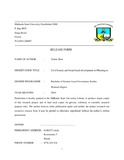Please use this identifier to cite or link to this item:
https://cris.library.msu.ac.zw//handle/11408/2554| Title: | Civil Society and broad based development in Mberengwa | Authors: | Zhou, Talent | Keywords: | Broad based development | Issue Date: | 2014 | Publisher: | Midlands State University | Abstract: | The research aimed to ascertain the impact and influence of civil society particularly NGOs in achieving broad based development in the rural district of Mberengwa. The research was prompted by the lack of effectiveness of civil society in promoting broad based development. There has been mushrooming of CSOs within the development sector but with no significant development gains. The reason for undertaking this study was to identify the role of NGOs in the promotion of broad based development and to find out what causes the ineffectiveness of NGOs in promoting broad based development. The research examined the capacity of these NGOs, weaknesses and challenges in influencing or causing broad based development. A detailed case study was undertaken in the district of Mberengwa; and the impact of the following NGO projects on attaining broad based development: International Labour Organisation TREE project, Care International PRIZE project and World Vision Negove, Nyamhondo, Ngungumbane Area Development Projects. In order for the researcher to come with various answers to his research, data was gathered from beneficiaries of these projects, councillors, Mberengwa District Administrator, District heads of relevant government departments, programme officers of International Labour Organisation, Care International and World Vision. The researcher used a sample of 100 from a population of 490. Descriptive research design was used and questionnaires, field observation, document analysis and interviews were used as research instruments. The study showed that NGOs have a positive impact on influencing broad based development although they have some shortcomings. However, they are mostly affected by the legal framework under which they are operating. Laws such as Private and Voluntary Organisation Act impose restrictive hindrances that limit NGOs sources of funding which is a critical element to determine the scale of their operation. The study recommends that laws governing civil society in Zimbabwe that restricts the operations of NGOs be repealed or amended. Finally, it is also recommended that further research be undertaken in order to establish how best NGOs can influence broad based development. | URI: | http://hdl.handle.net/11408/2554 |
| Appears in Collections: | Bsc Local Governance Studies Honours Degree |
Files in This Item:
| File | Description | Size | Format | |
|---|---|---|---|---|
| talent dissertation.pdf | Full Text | 1.27 MB | Adobe PDF |  View/Open |
Page view(s)
92
checked on Apr 12, 2025
Download(s)
98
checked on Apr 12, 2025
Google ScholarTM
Check
Items in MSUIR are protected by copyright, with all rights reserved, unless otherwise indicated.



